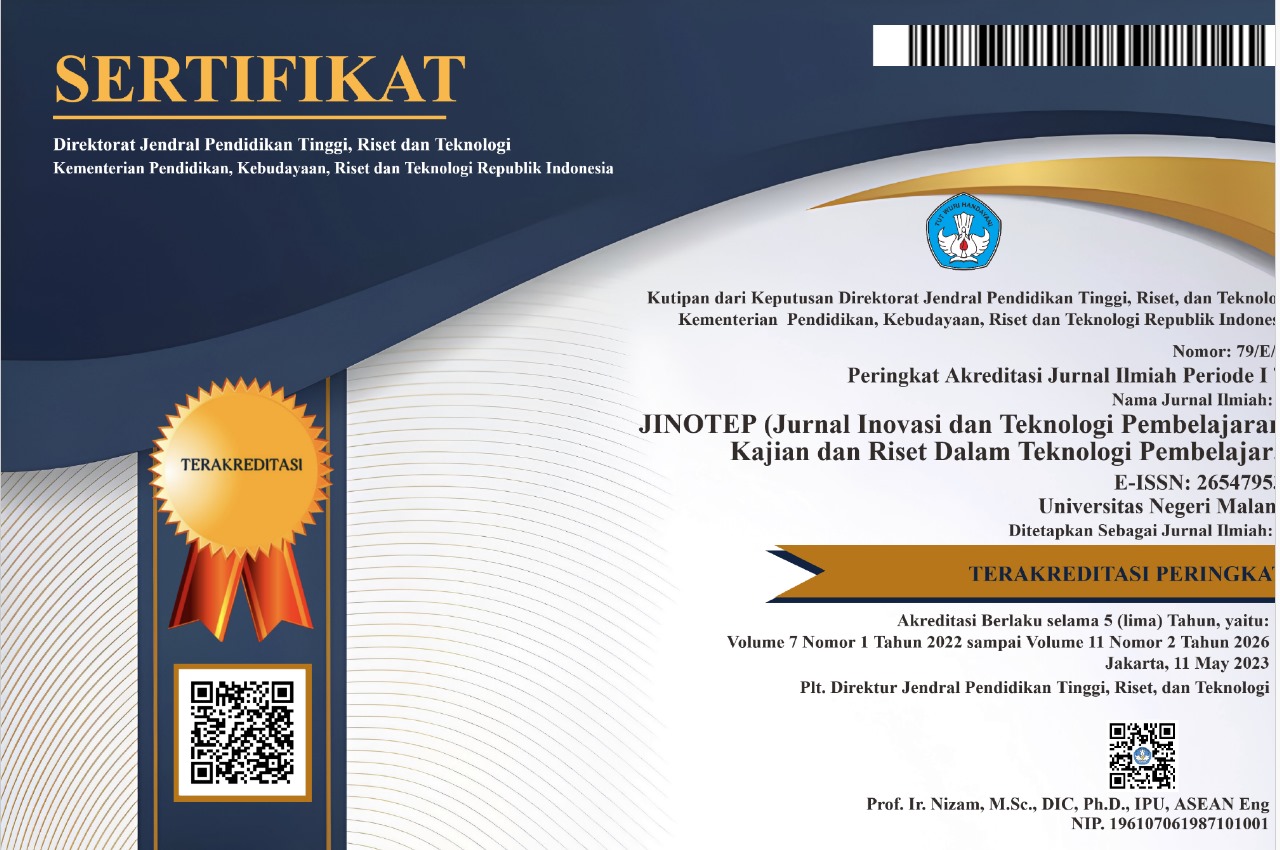Schoology-Based E-Learning: Judging from The Quality of Learning
Abstract
Abstrak: Penelitian ini bertujuan untuk mendeskripsikan implementasi proses e-learning berbasis Schoology ditinjau dari kualitas pembelajaran. Penelitian ini menggunakan pendekatan kualitatif dengan analisis deskriptif. Hasil penelitian menyatakan bahwa e-learning berbasis Schoology dapat menghasilkan pembelajaran yang berkualitas, yaitu: 1) kemampuan komunikasi melalui tulisan yang lebih baik, baik bagi siswa maupun guru; 2) siswa menjadi lebih aktif karena memiliki kewajiban untuk mengemukakan pendapatnya dalam forum diskusi; 3) setiap individu mampu menciptakan suasana kelas secara mandiri, namun guru tetap memiliki peran untuk menentukan strategi pembelajaran yang tepat agar siswa tidak cepat merasa bosan; 4) Materi pembelajaran lebih terfokus karena minim gangguan dibandingkan proses pembelajaran tatap muka. Selain itu, penggunaan e-learning berbasis schoology memotivasi siswa untuk memiliki target nilai sehingga menjadi lebih serius dalam mengerjakan tugasnya, lebih disiplin baik dalam kehadiran maupun pengumpulan tugas.
Abstract: This study aims to describe the implementation of the Schoology-based e-learning process in terms of learning quality. This study uses a qualitative approach with descriptive analysis. The results of the study stated that Schoology-based e-learning can produce quality learning, namely: 1) better communication skills through writing, both for students and teachers; 2) students become more active because they have an obligation to express their opinions in discussion forums; 3) each individual is able to create a class atmosphere independently, but the teacher still has a role to determine the right learning strategy so that students do not get bored quickly; 4) Learning materials are more focused because there are minimal distractions compared to the face-to-face learning process. In addition, the use of schoology-based e-learning motivates students to have target values so that they become more serious in doing their assignments, more disciplined both in attendance and in collecting assignments.
Keywords
Full Text:
PDFReferences
Aminoto, T., & Pathoni, H. (2014). Penerapan Media E-Learning Berbasis Schoology Untuk Meningkatkan Aktivitas dan Hasil Belajar Materi Usaha dan Energi Di Kelas XI SMA N 10 Kota Jambi Tugiyo. Sainsmatika, 28(1), 13–29.
Anggraeni, A., & Rachmijati, C. (2021). The Use Of Schoology As An Alternative Of Learning Applications in The Covid-19 Pandemic Period To Improve Students Writing Ability. PrimaryEdu - Journal of Primary Education, 5(1), 119. https://doi.org/10.22460/pej.v5i1.2138
Bohnsack, R., Pfaff, N., & Weller, W. (2010). Qualitative Analysis and Documentary Method: In International Educational Research. In Barbara Budrich Publishers Opladen & Farmington Hills. https://doi.org/10.3224/86649236
Budhiman, A., Ellianawati, E., & Wahyuni, S. (2021). Implementation of Science Virtual Class Based Schoology in Improving Students’ Critical Thinking Skill. Journal of Innovative Science Education, 10(2), 209–215.
Choirudin, C. (2017). Efektivitas Pembelajaran Berbasis Schoology. NUMERICAL: Jurnal Matematika Dan Pendidikan Matematika, 1(2), 52–62. https://doi.org/10.25217/numerical.v1i2.131
Edmonds, W. (2019). Snowballing … #Prayforme: A Qualitative Study Using Snowball Sampling. In Snowballing … #Prayforme: A Qualitative Study Using Snowball Sampling. https://doi.org/10.4135/9781526491039
Febrianto, T., Ngabekti, S., & Saptono, S. (2021). The effectiveness of schoology-assisted PBL-STEM to improve critical thinking ability of Junior High School Students. Journal of Innovative Science Education, 10(908), 222–229. https://journal.unnes.ac.id/sju/index.php/jise/article/view/42993
G.P.R, D., L.D.S., A., & K.S., P. (2019). Students Perception on The Design Of Asynchronous Online Discussion Using Schoology In English Language Education Ganesha University Of Education. International Journal of Language and Literature, 3(1), 1. https://doi.org/10.23887/ijll.v3i1.20597
Hardani. (2020). Metode Penelitian Kualitatif & Kuantitatif. In CV. Pustaka Ilmu Editor.
Haryati, T., & Rochman, N. (2012). Peningkatan Kualitas Pembelajaran Pendidikan Kewarganegaraan Melalui Praktik Belajar Kewarganegaraan (Project Citizen). Jurnal Ilmiah Civis.
Hilyana, F. S., & Hakim, M. M. (2018). Integrating character education on physics courses with schoology-based e-learning. Journal of Information Technology Education: Research, 17, 577–593. https://doi.org/10.28945/4164
Indrawati, F. A., Wadono, & Junaedi, I. (2021). Mathematics Literacy Ability in Terms Of Self Efficacy in Cooperative Learning Type of Group Investigation Model With HumanismApproachAssisted by Schoology. Unnes Journal of Mathematics Education Research, 11(1), 83–93. https://journal.unnes.ac.id/sju/index.php/ujmer/article/view/39619
Kahlke, R. M. (2014). Generic qualitative approaches: Pitfalls and benefits of methodological mixology. International Journal of Qualitative Methods, 13(1), 37–52. https://doi.org/10.1177/160940691401300119
Linda, R., Anggraini, C., & Abdullah. (2020). The Development of Schoology as Media to Supporting Blended Learning on Stoichiometry Topic. Journal of Physics: Conference Series, 1655(1). https://doi.org/10.1088/1742-6596/1655/1/012063
Muhid, A., & Ferdiyanto, F. (2020). Stres akademik pada siswa: Menguji peranan iklim kelas dan school well-being. Persona:Jurnal Psikologi Indonesia, 9(1), 140–156. https://doi.org/10.30996/persona.v9i1.3523
Ninoriya, S., Chawan, P. ., & Meshram, B. . (2011). CMS, LMS and LCMS For eLearning. International Journal of Computer Science Issues, 8(2), 644–647.
Rahmadoni, J., Arifnur, A. A., & Wahyuni, U. M. (2020). Penerapan Schoology Sebagai Learning Management System Bagi Guru SMA N 1 Sutera. Jurnal Hilirisasi IPTEKS, 3(2), 129–137. https://doi.org/10.25077/jhi.v3i2.418
Rodríguez Tamayo, I. Y., & Vargas Hernández, L. J. (2020). Schoology: una herramienta para el desarrollo de la habilidad escrita en inglés. Colombian Applied Linguistics Journal, 22(1), 13–28. https://doi.org/10.14483/22487085.14348
Rosaline, B. (2011). Introducing Qualitative Research. In Introducing Qualitative Research. https://doi.org/10.4135/9780857029034
Sitinjak, A. A. (2020). The Effect of Learning Method Schoology Applications and Learning Style on Student Learning Outcomes. International Journal for Innovation Education and Research, 8(6), 113–119. https://doi.org/10.31686/ijier.vol8.iss6.2380
Sugiarto, D. M. P. (2017). Pengembangan E-Learning Berbasis Schoology untuk Meningkatkan Hasil Belajar Siswa pada Mata Pelajaran Jaringan Dasar Kelas X TKJ. It-Edu, 2(01), 1.
Sukanto, D. (2020). Pembelajaran Jarak Jauh Dengan Media E-Learning Sebagai Solusi Pembelajaran Pada Masa Pandemi Corona Virus Disease 2019 (Covid-19). Syntax Idea, 2(11).
Supratman, E., & Purwaningtias, F. (2018). Pengembangan Media Pembelajaran E-Learning Berbasis Schoology. Jurnal Informatika: Jurnal Pengembangan IT, 3(3), 310–315. https://doi.org/10.30591/jpit.v3i3.958
Tambunan, L., Rusdi, R., & Miarsyah, M. (2018). Efectiveness of Problem Based Learning Models by Using E-Learning and Learning Motivation Toward Students Learning Outcomes on Subject Circullation Systems. Indonesian Journal of Science and Education, 2(1), 96. https://doi.org/10.31002/ijose.v2i1.598
Tigowati, T., Efendi, A., & Budiyanto, C. W. (2017). E-learning Berbasis Schoology Dan Edmodo: Ditinjau Dari Motivasi dan Hasil Belajar Siswa SMK. Elinvo (Electronics, Informatics, and Vocational Education), 2(1), 49–58. https://doi.org/10.21831/elinvo.v2i1.16416
DOI: http://dx.doi.org/10.17977/um031v8i32021p207
Refbacks
- There are currently no refbacks.
Copyright (c) 2021 Hana Permata Heldisari, Aldhila Mifta Firdhani

This work is licensed under a Creative Commons Attribution-ShareAlike 4.0 International License.
======================================================================
Jurnal Inovasi dan Teknologi Pembelajaran published by Universitas Negeri Malang in collaboration with the Asosiasi Program Studi Teknologi Pendidikan Indonesia (APS TPI) and Ikatan Profesi Teknologi Pendidikan Indonesia (IPTPI) with a MoU.
Publisher Address:
Educational Technology Laboratorium, Building D5, 1st Floor
Faculty of Education, Universitas Negeri Malang
Semarang St. No. 5, Malang City, East Java Province, Postal Code 65145
Email: jinotep.fip@um.ac.id
======================================================================

JINOTEP is licensed under a Creative Commons Attribution-ShareAlike 4.0 International License.
JINOTEP Statistics (Since July 13th, 2020)



.png)




.png)
1.png)
1.png)
4.png)
2.png)
1.png)
1.png)
.png)


_3.png)





1.png)
.png)